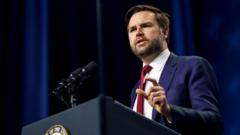Amidst optimism from US Vice-President JD Vance regarding a UK-US trade deal, deep-seated complexities and looming tariffs could shape the negotiations. With the UK emphasizing economic collaboration rather than a conventional free trade agreement, both sides must navigate challenges including existing tariffs and evolving export regulations.
Navigating the Intricacies of a Potential UK-US Trade Deal

Navigating the Intricacies of a Potential UK-US Trade Deal
As trade talks between the UK and US intensify, questions arise about the specifics and implications of a potential agreement.
UK-US trade discussions appear promising, with US Vice-President JD Vance indicating a "good chance" for an agreement, primarily due to a favorable relationship compared to other European nations. UK Business and Trade Minister Sarah Jones supports these talks, emphasizing the goal of avoiding tariff conflicts.
However, the key to understanding the enthusiasm lies in defining "deal". Following Prime Minister Sir Keir Starmer's meeting at the White House, UK officials opted to characterize upcoming negotiations as "economic deals," steering clear of traditional free trade agreements that broadly encompass goods.
Past attempts under President Trump encountered hurdles, notably around healthcare costs and agricultural standards. This time, however, conversations seem to pivot toward collaboration in science, technology, and artificial intelligence, in exchange for managing tariffs. The US has raised concerns about the UK's "tech tax" on US digital businesses and legislation tied to online safety.
Yet, a complication arises— the US has imposed a 10% tax on UK imports, identifying it as a "reciprocal tariff." While the UK exports more to the US than it imports, which does not align with the general trend, the US maintains this as a baseline rate across all trading partners. Extending exemptions for specific countries could lead to trading diversions, making for a tricky negotiating environment for the UK.
Compared to other nations facing harsher tariffs, the UK is under unique scrutiny. Notably, the automotive sector is seeing 25% tariffs, heightening the British stakes in these discussions. Additionally, ongoing post-Brexit negotiations with the EU add further context, as both parties aim to minimize export barriers and facilitate smoother trade relations.
The US has exhibited interest in joining forces with allies to strategically counter China's influence, potentially compelling the UK to align its interests accordingly. This creates a tension that could undermine the UK’s narrative of being interconnected with the global economy, which balances markets across Europe, the US, and East Asia.
Finally, it's crucial to recognize the shifting dynamics within the US—recent turbulence in financial markets has given the UK some leverage, a situation it may need to exploit in negotiations. With the stakes high, the outcome of this trade dialogue holds significant implications for both nations moving forward.





















